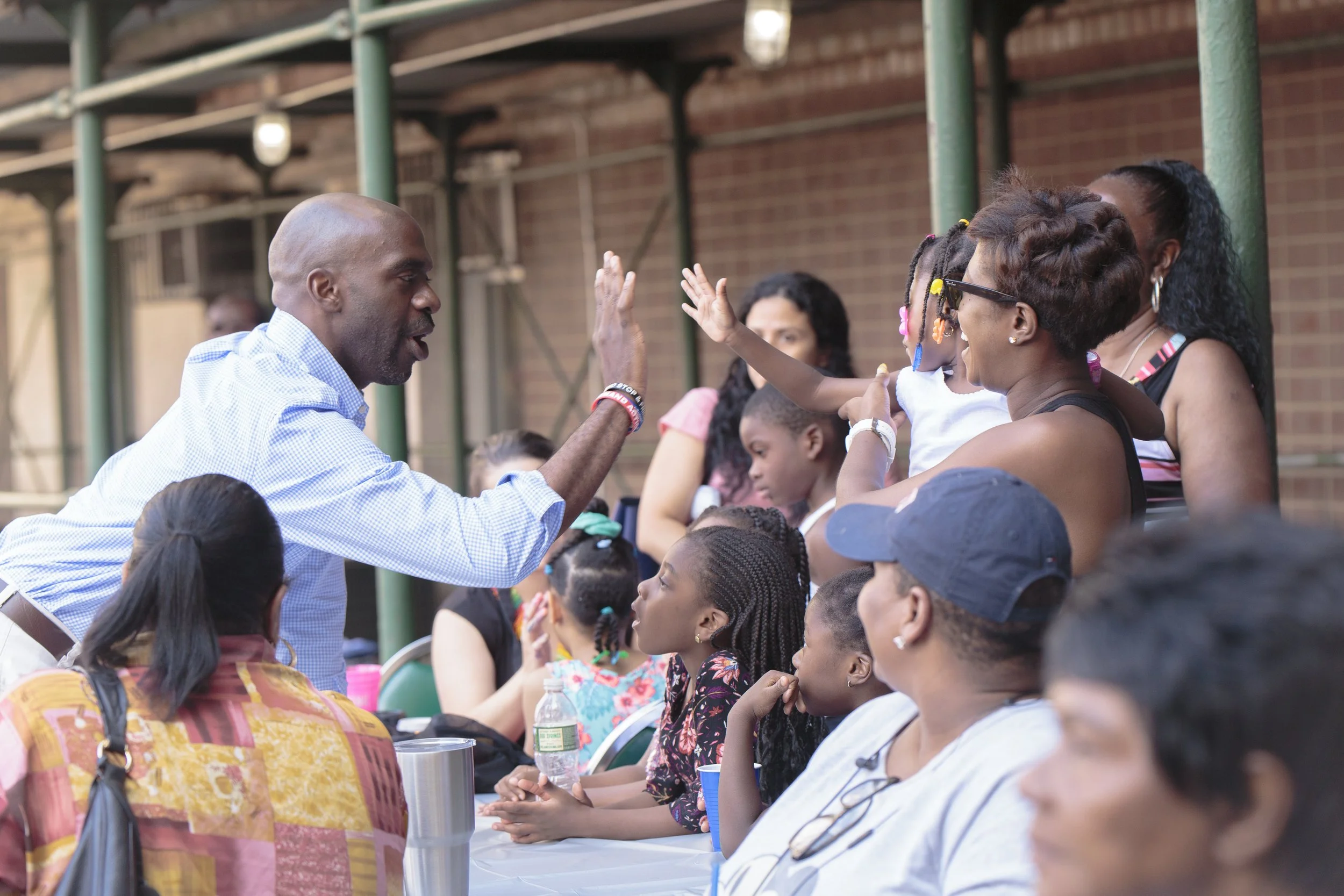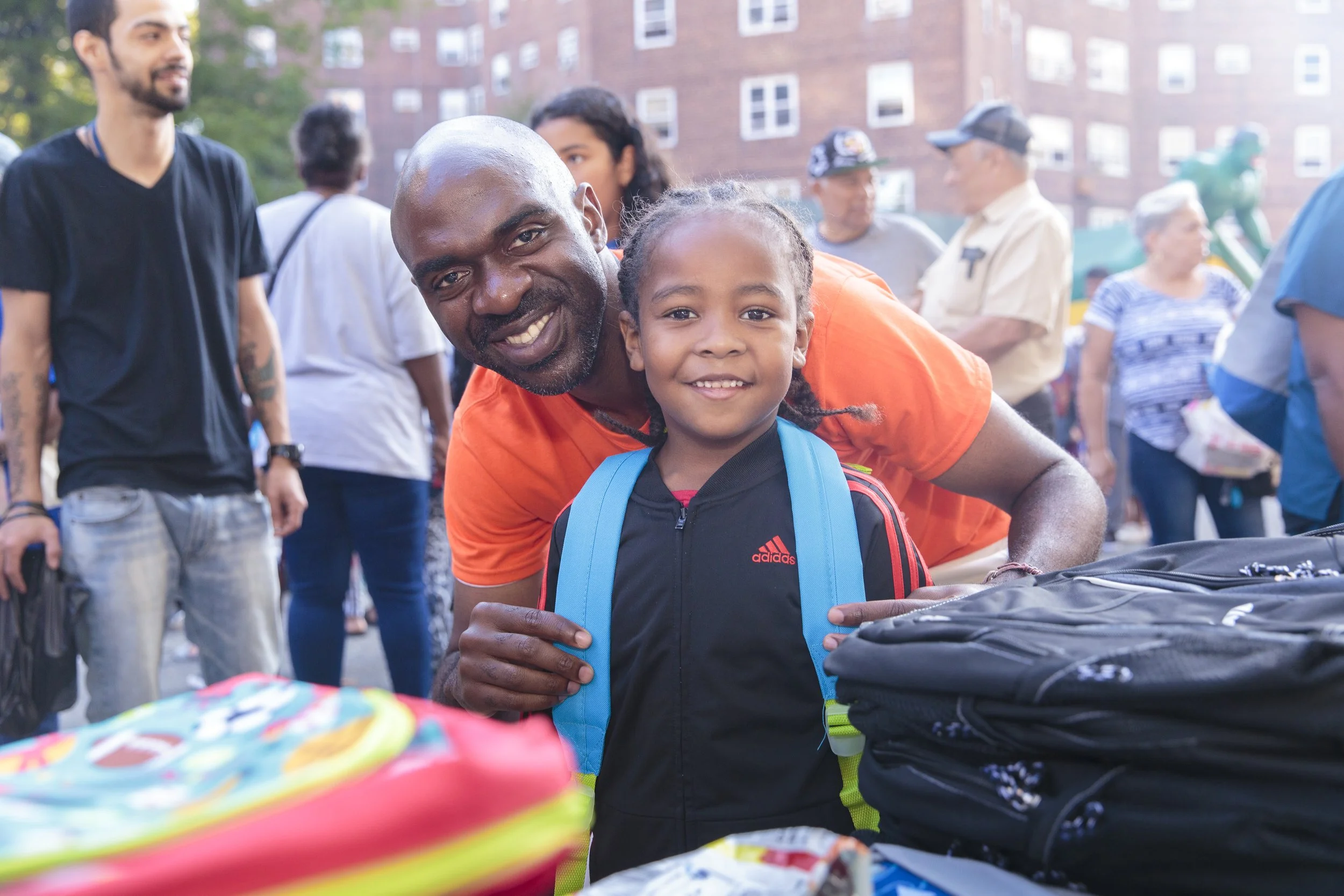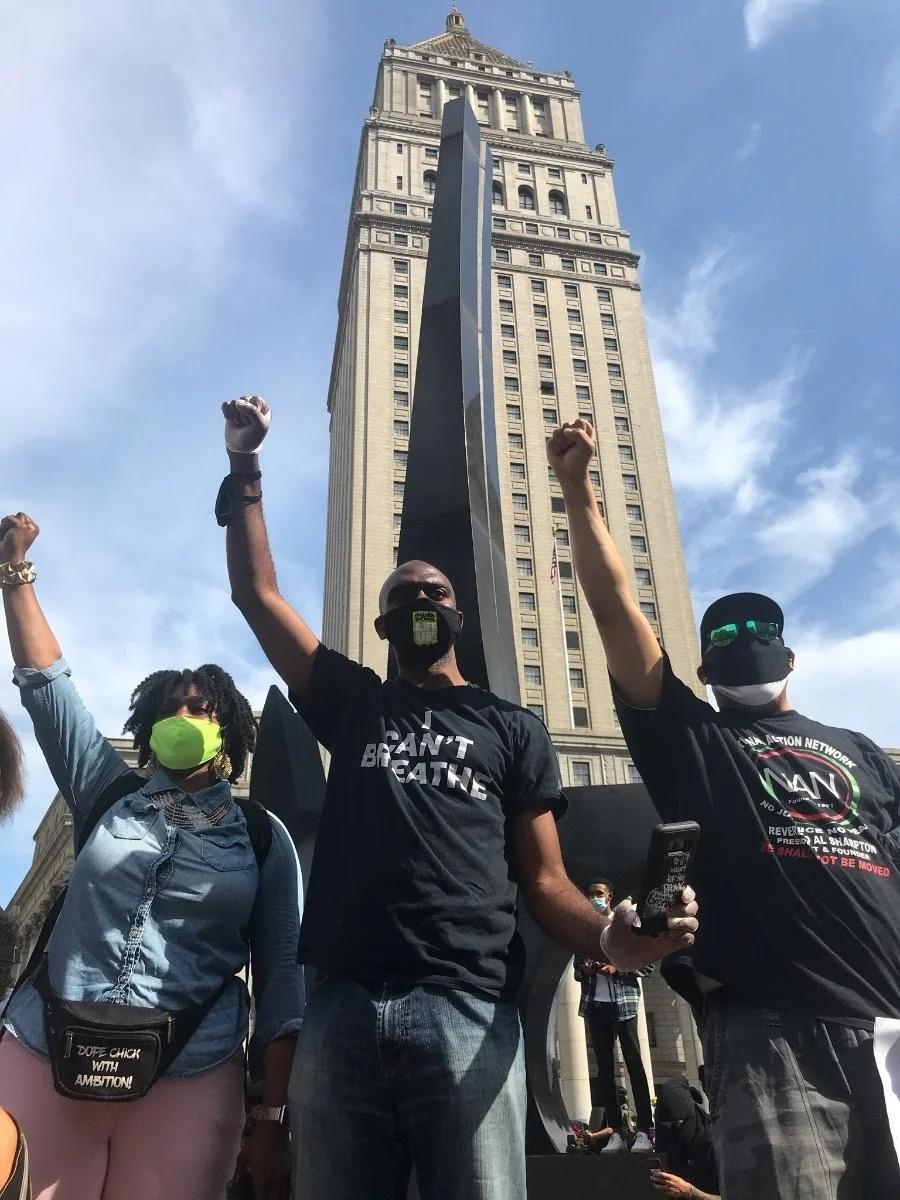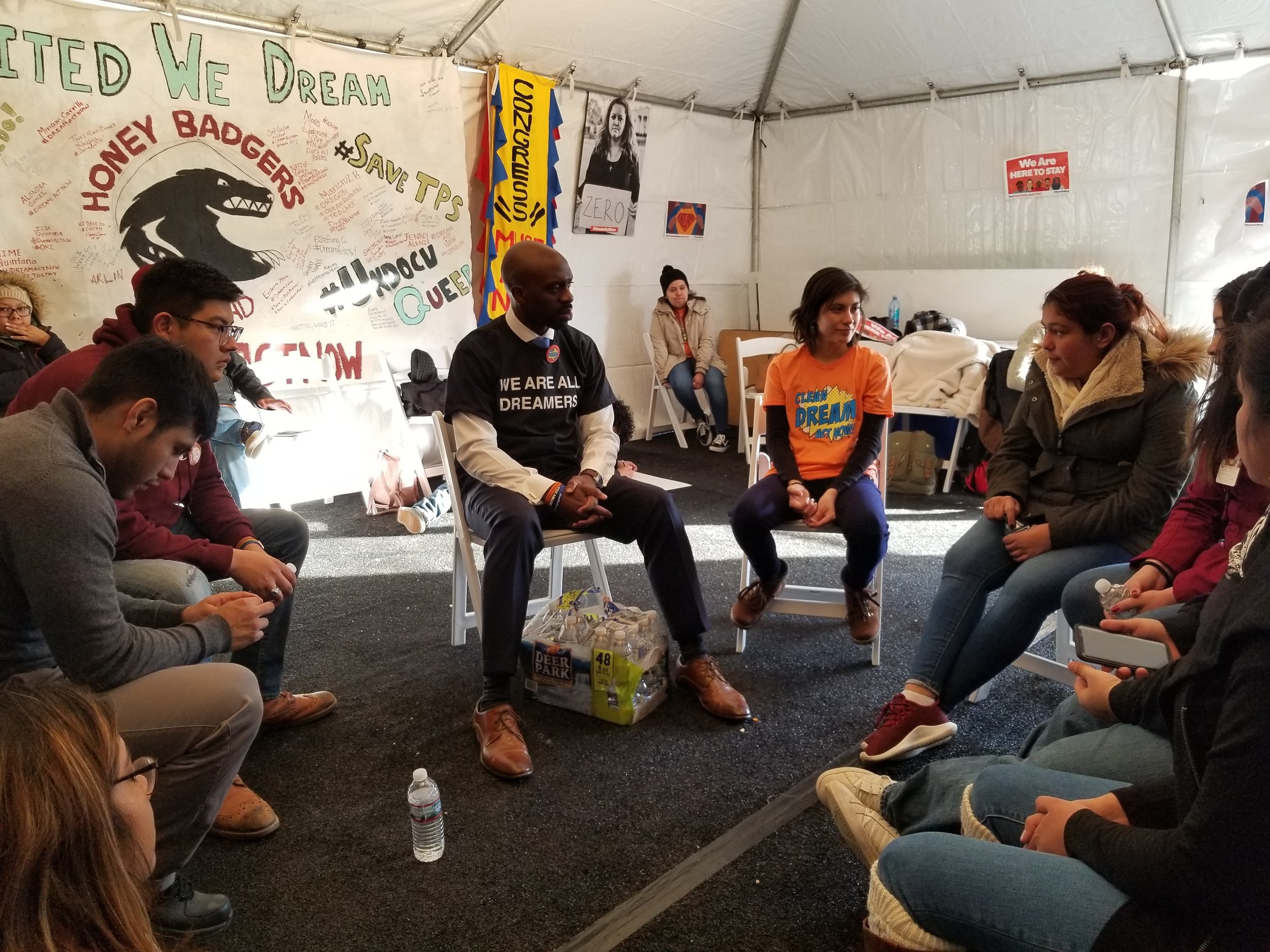The Bronx Plan:
More Affordable. Safer. Fairer.
Michael Blake is a son of the South Bronx, a former New York State Assembly Member who served in the Obama White House, and a small business owner who has created local jobs. He knows families are getting squeezed by rent, child care, transit costs, and uneven public safety. In neighborhoods like Mott Haven and Melrose, roughly one in three renters (≈35%) are severely rent-burdened—paying at least half their income in rent—and these pressures have intensified as the status quo greenlights luxury projects for higher-income newcomers instead of homes affordable to longtime South Bronx residents. Across the borough, NYCHA’s Bronx footprint—about 67 developments and nearly 39,000 apartments—faces chronic repair backlogs, mold and heat outages, and anxiety around PACT conversions. With median household income around $45,000, “affordable” must actually match what Bronx families can pay.
The Bronx Plan is a practical, people-first agenda to lower the cost of living, fix NYCHA, keep our neighborhoods safe, and build real pathways to good jobs—so longtime residents can stay, thrive, and lead. Blake’s plan puts working people first, delivering real affordability, stability, and dignity.
Housing
No Credit Checks for Housing Eligibility: Eliminate credit score requirements for affordable housing and first-time homeownership programs to remove discriminatory barriers. Expand down-payment assistance, support community land trusts, and pilot alternative underwriting so credit scores aren’t a barrier to first-time homeownership for responsible renters.
Price Homes to Neighborhood Incomes (Local Median Income, not Regional AMI):
Push HUD and local partners to anchor affordability to neighborhood-level incomes so units are priced to what NY-15 residents actually earn—especially where incomes are far below regional Area Median Income (AMI).Rent Freeze for Rent-Stabilized Tenants:
Support the next mayor in enacting a rent freeze for the Bronx’s ~210,000 rent-stabilized households, protecting seniors and working families from displacement—while pairing the freeze with hardship relief for small, mom-and-pop landlords.Fix the NYCHA Backlog—Now.
Fund fast, visible repairs (heat, elevators, roofs, mold), guarantee iron-clad tenant protections for improvements that require temporary displacement, and slash utility bills with green upgrades—while training and hiring NY-15 residents to do the work through local nonprofit partners. See more about our Housing Plan, including NYCHA NOW below.Build More Affordable Homes, Including for Seniors:
Accelerate construction and preservation of deeply affordable, senior, and working-family housing—pairing federal tools (LIHTC, Housing Trust Fund, project-based vouchers) with city and state financing so “affordable” actually matches Bronx incomes.
Champion “Medicare for All”:
Every family—regardless of income and zip code—deserves access to affordable, high-quality care, while lowering costs through preventive medicine, community clinics, and simplified enrollment so no New Yorker falls through the cracks.
Lower Grocery Bills:
Use the federal Healthy Food Financing Initiative to help local grocers open full-service supermarkets in food deserts and assist existing stores in remaining profitable. Families get a store closer to home, lower prices from real competition, fresher produce, SNAP/WIC acceptance from day one, and dozens of local jobs.
Protect and strengthen the Department of Education:
By expanding the kinds of evidence-based programs Michael championed in the Assembly—initiatives that support our young people through mentoring, literacy, debate, and pathways to college and quality careers, we can focus on raising graduation rates.
Lower Energy Bills:
Reduce what low-income families pay for heat and electricity by leveraging existing federal funding and partnerships to pay for simple home upgrades (better insulation, efficient heaters/heat pumps); auto-enroll constituents in existing energy discounts based on eligibility status; expand community solar for monthly bill credits; and work with a Green Jobs Academy to train and hire local residents to weatherize buildings and implement green upgrades—creating good jobs while cutting bills. Additionally, demand federal intervention to investigate and end the systemic price-gauging by utility monopolies like Con Edison, which charges Bronx residents disproportionately higher rates than other boroughs for the same service, a clear economic injustice that functions as a form of neighborhood redlining.
Protect the Benefits our Families Earned:
Michael will fight any attempt to cut Medicare, Social Security, or SNAP—lifelines that keep Bronx seniors and families afloat. In NY-15, more than 270,000 residents use SNAP, about 110,000 neighbors receive Social Security, and about 15.5% of Bronx residents are 65 or older, most of whom rely on Medicare. He’ll oppose cuts, block benefit rollbacks, and organize with the Mayor, the Governor, and New York’s congressional delegation to protect and strengthen these programs—so seniors can age with dignity and families can put food on the table.
Child Care Families Can Afford:
Make child care free for low-income families and dramatically more affordable for the middle class by expanding federal support (CCDBG, Head Start/Early Head Start), boosting wages for providers, and partnering with the City to add 3K and 4K seats in NY-15.
Protecting Food Benefits:
Create a mandate and fund simple security upgrade: replacing outdated magnetic stripe EBT cards with the secure chip technology used by every modern debit and credit card. With nearly 300k neighbors in the Bronx relying on SNAP, our district is being targeted at a far higher rate, where organized crime uses cheap devices to steal money. We cannot allow vulnerable residents to lose their food money because Washington refuses to fight for the needy.
Transit that Doesn’t Break the Budget:
Expand and federally support a fare-free program for low-income New Yorkers, building on the City’s Fair Fares program so eligible Bronx riders can get to work, school, medical care, and child care.
Family Budget:
Groceries, Child Care, Energy and Transit
Make the Bronx Safer
Public safety is a top concern in NY-15. The South Bronx consistently ranks among the city’s highest for violent crime. Quality-of-life issues—street disorder, open-air drug use, and overdose—compound the strain. The Bronx has for years had the highest rates of overdose deaths in NYC, and while shootings and homicides have fallen from their pandemic peaks, they remain above 2019 levels. The Bronx needs increased resources for mental health care and outreach, increased anti-gun violence programs, precision policing and community-led prevention.
Expand Mental-Health Services for People with Mental Illness:
Working with the Mayor’s Office and Governor, fund 24/7 mobile care teams, outpatient stabilization teams, and additional supportive-housing apartments. Ensure people with serious mental illnesses being discharged from emergency rooms and jails are connected to community care so no one falls through the cracks, and support the Mayor’s Office in hiring more mental-health professionals, social workers, and peer specialists to reach people with the highest needs.Address Quality-of-Life Issues Head-on:
Develop a district-wide taskforce of federal, state and local agencies that work in coordination to keep corridors clean, brighten streets with better lighting, and ensure trash is picked up on schedule. Working with community leaders, the taskforce will protect storefronts with targeted nuisance enforcement carried out in coordination with small businesses and resident associations—not imposed on them. The task force will coordinate block-by-block improvements in partnership with local merchants, tenant and faith leaders, while agencies such as NYPD, DSNY, and DOT publicly track progress and results.Scale Up Cure Violence–style Community Violence Intervention (CVI) and Cognitive-Behavioral Therapy (CBT)–based Programs:
These proven programs and strategies reduce shootings and retaliatory violence. In NY-15, that means leveraging federal dollars to expand street-outreach and mediation capacity through local CVI anchors like BRAG/Good Shepherd Services and BronxConnect’s RTG, and strengthening hospital-based violence intervention programs at Jacobi and Lincoln so victims and families get bedside mediation, safety planning, and wraparound support the moment harm occurs.Precision Policing, Not Over-Policing:
Work with local and federal law enforcement to focus on the small share of people and places driving serious violence; investing in strong investigations and gun-trafficking interdiction; and reducing unnecessary stops and overly broad tactics that erode community trust.
Support Local Businesses and Create Jobs
Supporting local businesses and creating good jobs, with the support of federal funding, is essential in NY-15 because the Bronx economy is powered by neighborhood entrepreneurs—from bodegas and barbers to auto shops, restaurants, and home-care providers. With household incomes well below the city average and many families heavily rent-burdened, every job created locally stretches further: it keeps dollars circulating on our commercial corridors, stabilizes housing, and gives young people clear, paid pathways into careers. When we help small businesses access capital, get paid on time for public work, and win procurement opportunities, we reduce business turnover and increase steady, good paying local jobs. The result is safer, brighter corridors, open storefronts instead of vacancies, and wealth that grows in the neighborhood rather than leaving it.
Put More Money in Bronx Businesses’ Hands:
Expand low-interest lending through SBA programs and local CDFIs so entrepreneurs can start up, scale, and survive slow seasons. Simplify federal procurement so neighborhood firms can actually win contracts, and provide hands-on technical assistance to help them apply for federal grants.Create Green Jobs:
Launch a Green Jobs Academy (with CUNY, unions, and employers) to train New Yorkers in heat-pump/electrification, energy efficiency, solar, and climate-resilience maintenance—with paid training and direct placement on NYCHA and community retrofits.Year-Round Youth Employment:
Build year-round youth employment—not just summer gigs. Turn summer jobs into paid, 12-month pathways in tech, health care, construction, and climate, and pair every participant with a mentor. For students who complete important milestones, offer academic credit at CUNY to help students jumpstart college.Empower MWBEs to Grow and Compete:
Expand access to federal contracts for Minority- and Women-Owned Business Enterprises by simplifying certification, raising procurement targets, and enforcing accountability for agencies that fall short. Invest in technical assistance and local partnerships so Bronx entrepreneurs can navigate funding opportunities, access capital, and scale their businesses.Cut Red Tape, Not Opportunity:
Work with federal, state, and city partners to streamline regulations that slow down small businesses—eliminating redundant paperwork, aligning licensing rules, and creating one-stop digital portals for compliance. Free up entrepreneurs to hire, innovate, and focus on serving their communities instead of fighting bureaucracy.Support the Chef-to-Community Tax Credit:
Champion a federal tax credit that rewards restaurants for preparing and donating high-quality meals to food-insecure families. This initiative, backed by Rethink Food, would cut waste, strengthen local businesses, and ensure surplus food feeds neighbors instead of landfills—turning restaurants into vital partners in the fight against hunger.
Protecting Our Rights at Home & Human Rights Abroad
Michael is a community organizer and a fighter. At home, he will stand up to unlawful mass enforcement and community violence carried out by ICE, require real judicial warrants, protect sensitive locations like schools,clinics and places of worship, fund community legal services, and keep families together. He will protect the benefits our families earned—Medicare, Social Security, and SNAP—by blocking cuts, stopping rollbacks, and making access simpler and faster. Abroad, he will fight for a just peace for Palestinians and Israelis: support an immediate, permanent ceasefire, surge and uninhibited humanitarian aid, secure the release of all hostages, and condition U.S. assistance on compliance with human rights, U.S. and international laws. Michael would sign onto both the Block The Bombs Act and the Stand Up for Sudan Act because he believes our tax dollars should be used to feed, house and educate children at home, not kill children overseas.
Stand Up for Immigrant Neighbors:
Stand upPush back against unlawful mass enforcement by ICE by publicly protesting and supporting local organizers; force ICE to show warrants, and work with community leaders to protect sensitive locations, including our schools and daycares, and fund community legal services and rapid-response so families aren’t torn apart.Stand with the Caribbean After Natural Disasters:
Make supporting our Caribbean neighbors a firm priority in Congress—ensuring fast, fair disaster relief, resilient infrastructure investment, and long-term recovery funding.End Genocide and Protect Civilians:
Support diplomacy and humanitarian access to stop mass atrocities, enforce international and U.S. laws in our aid and arms sales to all countries, sanction perpetrators, expand refugee relief, right of return, allowing uninhibited food and aid into Gaza and allowing the distribution of food by trusted humanitarian partners.Address Antisemitism, Anti-Muslim and All Forms of Hate:
Fund community security and victim support services, improve hate-crime enforcement and data collection, and strengthen school and community programs that build understanding and safety, including expanding Holocaust/genocide and anti-bias education.End Conflicts and Restore Trust:
Hold members of Congress to the highest ethical standards by banning stock trading and financial self-dealing tied to pending legislation. Require full transparency of assets, outside income, and potential conflicts of interest, and strengthen penalties for those who profit from insider knowledge. Voters deserve representatives who serve the public interest—not their own portfolios.Stand Up for the First Amendment:
Free speech is at risk from government overreach and intimidation campaigns. Michael will vigorously defend free speech, free press, peaceful assembly, and freedom of religion. He will oppose viewpoint discrimination by government actors and protect lawful protest in public spaces.Protect LGBTQIA+ Rights in Daily Life:
Enforce existing federal protections in employment, housing, health care, and education; increase funding for local LGBTQIA+ centers, youth-homelessness services, and safe-schools programs; require accurate hate-crime reporting and protect targeted communities; and safeguard access to medically necessary, evidence-based care under current law.Protect Women’s Rights and Reproductive Freedom:
Safeguard every woman’s right to make her own healthcare decisions by protecting and expanding access to abortion and contraception. Support federal protections like the Women’s Health Protection Act, ensure affordable reproductive care in every community, and defend women’s rights to equal pay, safety, and opportunity in the workplace and beyond.Reform Our Courts and Strengthen Democracy:
Support judicial reforms that restore fairness, transparency, and accountability in our courts—guided by experts like the Lawyers’ Committee for Civil Rights Under Law and the Brennan Center for Justice. Champion stronger ethics rules for judges, safeguards against voter suppression and gerrymandering, and reforms that protect democratic institutions from partisan abuse.
The Bronx Stands with Puerto Rico
The bond between Puerto Rico and The Bronx runs deep. Thousands of families in NY-15 trace their roots to Puerto Rico, and what happens on the island reverberates across our neighborhoods—from housing and jobs to culture and identity. Yet Puerto Rico remains a U.S. territory without full political representation, still burdened by colonial-era structures that deny its people self-determination and economic justice. Standing with Puerto Rico means standing with our neighbors here at home, and fighting for a fair, democratic, and dignified relationship between the United States and the island.
Support the right of the people of Puerto Rico to self-determination – backing a federally-sanctioned process so Puerto Ricans themselves decide their political future rather than outside actors.
Demand the end of the federal oversight board created under PROMESA – the so-called “fiscal control board” – and restore full democratic control over Puerto Rico’s budget, economic policy, and local governance.
Advocate for cancellation or deep restructuring of Puerto Rico’s debt burden so the island can invest in its people and infrastructure instead of servicing high-cost borrowing.
Push to make the Puerto Rico Electric Power Authority (PREPA) a publicly-owned and fully-funded utility again – prioritizing reliability, affordability, resilience, and democratic oversight of the island’s energy system.
End the impact of incentive laws like Act 22 of 2012 that attract wealthy outsiders and displace Puerto Rican residents. These tax breaks were meant to stimulate investment, but instead they’ve driven up housing costs, accelerated gentrification, and eroded local ownership. Congress should push for repeal or reform of Act 22, require transparency on who benefits, and support policies that keep land, housing, and economic opportunity in Puerto Rican hands.
MAKE A CONTRIBUTION
Pitch in today and let’s build a Bronx that works for everyone.
If you've saved payment information with ActBlue Express, your donation will go through immediately








